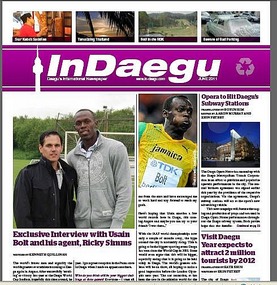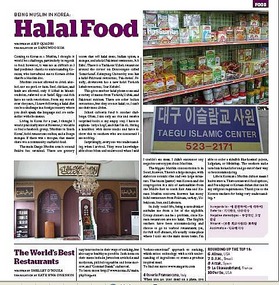My article 'Muslim in Korea' and a guide to halal food was published in the June issue of InDaegu. They had interviewed me about my Presidential Palace visit in their last issue (see earlier blog entry) and asked me to write about my experiences.
http://www
.in-daegu.com/PDFs/June2011.pdf
page 6 of 13
the messed up the part on Uzbek restaurants, theres supposed to be two restaurants
'Samarkand' by Daegu Station and 'Tashkent' around the corner on Donseongno
---------------------------
Original Text
Coming to Korea as a Muslim I thought would be a challenge, particularly in regards to food, but was not as difficult, with understanding from Koreans, and introduced me to korean dishes that fit a muslim diet.
Muslims are not allowed to drink alcohol nor eat pork and ham. Beef, chicken, and lamb are allowed, only if killed in islamic tradition, referred to as 'halal'. Eggs and Fish have no restriction. From my travels over the years I knew following a halal diet can be a challenge in a foreign country where you dont speak the language, and are unfamiliar with menus.
Living in Korea for a year I thought I would practically starve!. However, I was able to find a facebook group 'muslims in south korea', halal restaurants online, and a daegu mosque. If there was a mosque, that meant there was a community, and halal food.
The main daegu muslim area is around Bukbu bus terminal. There are grocery stores that sell halal meat, Indian spices, a Mosque, and a halal pakistani restaurant 'Ali baba'. Near Daegu Station is a halal Uzbek Restaurant ‘Samarkand’ and around the corner 'Tashkent' on Donseongno
. Keimyung University area has a halal pakistani restaurant ‘Pak-Asian’. Finally, downtown has a new halal turkish kebab restaurant ‘Star Kebabs’.
This gives me five halal places to eat and a variety of menus from Turkish, Uzbek, and Pakistani. There are other indian restaurants but they are not halal, so I can’t eat their meat dishes.
School cafeteria food is another challenge. Often I can only eat rice and have surprised looks from others at my empty tray. I have to explain 'aniyo goki', and that I'm ok. I bring a lunchbox with more snacks and have to show this to teachers who are concerned I ate nothing.
Surprisingly, everyone was understanding when I arrived. They were knowledgeable about Islam and understood when I said I couldnt eat meat. I didnt encounter any negative stereotypes about muslims.
The biggest muslim concentration is in seoul itaewon. There is a large mosque, with elaborate ceramic tiles and two large minarets. The imam (pastor) was korean and the congregation is a mix of nationalities from the middle east to south east asia, and korean muslim converts. Itaewon has many halal restaurants from pakistan, turkey, uzbekistan, iran, and lebanon.
In daily social life, being a non drinker excludes me from a lot of nitelife. Group dinners can be a problem since korean restaurants are not halal. The English teachers have been accomodating and goto a seafood restaurants, but for full staff dinners its usually somewhere I cant eat the main item. I’m able to order a sidedish like haemul pajan, kalguksu, or bibimbab. The teachers make sure I am looked after and go out of their way to be accomodating.
Life in Korea as a Muslim did not mean I had to starve, there are several food options, korean teachers have been very understanding, and I've acclimatized to korean dishes that can fit my religious requirements.
------------
See also blog entry 'Eid in Daegu'
http://blog.travelpod.com/travel-blog-entries/londone7/1/1320663320/tpod.html
The Korea Herald also interviewed me about Muslim Life in Korea
http://blog.travelpod.com/travel-blog-entries/londone7/1/1335353258/tpod.html
My Article 'Muslim in Korea' Published in June
Tuesday, June 07, 2011
 Daegu, South Korea
Daegu, South Korea
Other Entries
-
64Surprise Teachers Dinner... Again!
Apr 2048 days prior Daegu, South Koreaphoto_camera2videocam 0comment 0
Daegu, South Koreaphoto_camera2videocam 0comment 0 -
65Gwangalli Eobang Festival
Apr 2345 days prior Busan, South Koreaphoto_camera50videocam 0comment 0
Busan, South Koreaphoto_camera50videocam 0comment 0 -
66Rainy Saturday Hiding in Seoul Malls
Apr 3038 days prior Seoul, South Koreaphoto_camera27videocam 0comment 0
Seoul, South Koreaphoto_camera27videocam 0comment 0 -
67Jongmyo Daeje Royal Ancestral Ceremony
May 0137 days prior Seoul, South Koreaphoto_camera35videocam 0comment 0
Seoul, South Koreaphoto_camera35videocam 0comment 0 -
68Daegu Yangyeongsi Herb Festival & Star Kebabs
May 0335 days prior Daegu, South Koreaphoto_camera18videocam 0comment 0
Daegu, South Koreaphoto_camera18videocam 0comment 0 -
69My Interview with InDaegu Newspaper
May 0533 days prior Daegu, South Koreaphoto_camera3videocam 0comment 0
Daegu, South Koreaphoto_camera3videocam 0comment 0 -
70Arrival in Jeju
May 0632 days prior Jeju City, South Koreaphoto_camera12videocam 0comment 0
Jeju City, South Koreaphoto_camera12videocam 0comment 0 -
71Jeju Day 1 : Loveland, Queens House, Waterfalls
May 0731 days prior Seogwipo, South Koreaphoto_camera32videocam 0comment 1
Seogwipo, South Koreaphoto_camera32videocam 0comment 1 -
72Jeju Day 2 : Auto Museum, Miniature World, Jungmun
May 0830 days prior Jungmun, South Koreaphoto_camera43videocam 0comment 0
Jungmun, South Koreaphoto_camera43videocam 0comment 0 -
73Jeju Day 3 : Seongsan Ichulbong, Manjanggul Caves
May 0929 days prior Seongsan Ichulbong, South Koreaphoto_camera26videocam 0comment 1
Seongsan Ichulbong, South Koreaphoto_camera26videocam 0comment 1 -
74Teachers Day & Chilgok Confucian Academy
May 1325 days prior Daegu, South Koreaphoto_camera16videocam 0comment 0
Daegu, South Koreaphoto_camera16videocam 0comment 0 -
75My Blog Just Hit 10,000+ Page Views!!!
May 1919 days prior Daegu, South Koreaphoto_camera3videocam 0comment 0
Daegu, South Koreaphoto_camera3videocam 0comment 0 -
76Quiet Weekend in Daegu : Orphanage, Thor, New Bike
May 2117 days prior Daegu, South Koreaphoto_camera7videocam 0comment 0
Daegu, South Koreaphoto_camera7videocam 0comment 0 -
77School Sports Day
May 2513 days prior Daegu, South Koreaphoto_camera25videocam 0comment 1
Daegu, South Koreaphoto_camera25videocam 0comment 1 -
78Ulsan Whale Festival
May 2810 days prior Ulsan, South Koreaphoto_camera45videocam 0comment 1
Ulsan, South Koreaphoto_camera45videocam 0comment 1 -
79Haeundae Beach Sand Festival
Jun 043 days prior Busan, South Koreaphoto_camera46videocam 0comment 0
Busan, South Koreaphoto_camera46videocam 0comment 0 -
80Geoje Cruising and Pensioners Disco!
Jun 052 days prior Gohyeon, South Koreaphoto_camera23videocam 0comment 0
Gohyeon, South Koreaphoto_camera23videocam 0comment 0 -
81My Article 'Muslim in Korea' Published in June
Jun 07 Daegu, South Koreaphoto_camera3videocam 0comment 0
Daegu, South Koreaphoto_camera3videocam 0comment 0 -
82Speaking Exam and Contract Renewal
Jun 103 days later Daegu, South Koreaphoto_camera3videocam 0comment 0
Daegu, South Koreaphoto_camera3videocam 0comment 0 -
83School Movie Day
Jun 158 days later Daegu, South Koreaphoto_camera6videocam 0comment 0
Daegu, South Koreaphoto_camera6videocam 0comment 0 -
84Haedong Yonggungsa Temple & Fisheries Museum
Jun 1811 days later Busan, South Koreaphoto_camera43videocam 0comment 0
Busan, South Koreaphoto_camera43videocam 0comment 0 -
85Guide to Indian Spices in Daegu
Jun 2417 days later Daegu, South Koreaphoto_camera9videocam 0comment 0
Daegu, South Koreaphoto_camera9videocam 0comment 0 -
86Teachers Games Day, Contract Renewal, Monsoons
Jun 2417 days later Daegu, South Koreaphoto_camera7videocam 0comment 0
Daegu, South Koreaphoto_camera7videocam 0comment 0 -
87Victorian Daegu, Gothic Churches, Stained Glass
Jul 0225 days later Daegu, South Koreaphoto_camera50videocam 0comment 0
Daegu, South Koreaphoto_camera50videocam 0comment 0 -
88Bukchon Hanok Village
Jul 1538 days later Seoul, South Koreaphoto_camera36videocam 0comment 0
Seoul, South Koreaphoto_camera36videocam 0comment 0 -
89Incheon Chinatown, Colonial Past, Wolmi Park
Jul 1639 days later Incheon, South Koreaphoto_camera44videocam 0comment 0
Incheon, South Koreaphoto_camera44videocam 0comment 0 -
90Seoul Bellydance Evening
Jul 1639 days later Seoul, South Koreaphoto_camera25videocam 0comment 2
Seoul, South Koreaphoto_camera25videocam 0comment 2 -
91Kyunpook Natl University Museum & Currency Gallery
Jul 2245 days later Daegu, South Koreaphoto_camera48videocam 0comment 0
Daegu, South Koreaphoto_camera48videocam 0comment 0 -
92Daegu Modern History Museum
Jul 2346 days later Daegu, South Koreaphoto_camera18videocam 0comment 0
Daegu, South Koreaphoto_camera18videocam 0comment 0 -
93Camp Walker Kickball Tournament
Jul 2447 days later Daegu, South Koreaphoto_camera22videocam 0comment 0
Daegu, South Koreaphoto_camera22videocam 0comment 0 -
94Seoul Floods - 19 Dead
Jul 2750 days later Daegu, South Koreaphoto_camera17videocam 0comment 0
Daegu, South Koreaphoto_camera17videocam 0comment 0 -
95Summer Camp
Jul 2952 days later Daegu, South Koreaphoto_camera17videocam 0comment 0
Daegu, South Koreaphoto_camera17videocam 0comment 0 -
96New York by Air
Jul 3053 days later New York City, United Statesphoto_camera15videocam 0comment 0
New York City, United Statesphoto_camera15videocam 0comment 0 -
97I COULD BE A WINNER FOR A ROUNDTRIP TICKET HOME!!!
Jul 3154 days later Daegu, South Koreaphoto_camera5videocam 0comment 0
Daegu, South Koreaphoto_camera5videocam 0comment 0 -
98Daegu IAAF 2011 & Pyeongchang 2018
Aug 0155 days later Daegu, South Koreaphoto_camera8videocam 0comment 0
Daegu, South Koreaphoto_camera8videocam 0comment 0 -
99Korea Grill House Toronto
Aug 1064 days later Toronto, Canadaphoto_camera7videocam 0comment 0
Toronto, Canadaphoto_camera7videocam 0comment 0

 Daegu, South Korea
Daegu, South Korea





2025-05-22